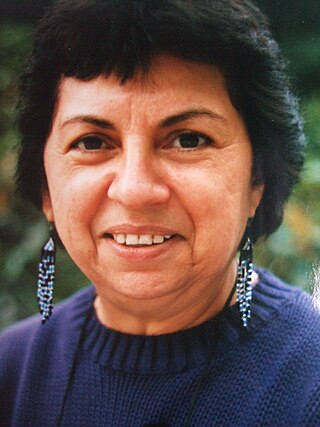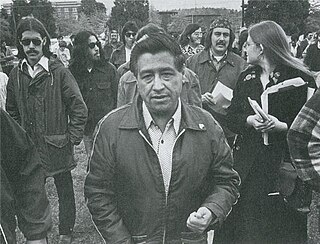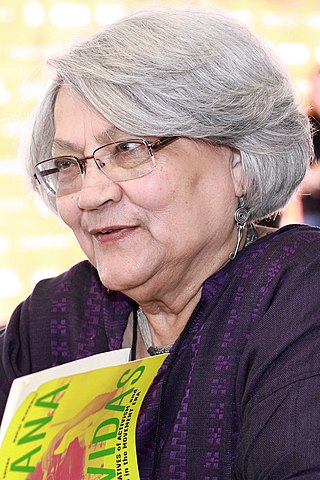Related Research Articles

Chicano or Chicana is an ethnic identity for Mexican Americans who have a non-Anglo self-image, embracing their Mexican Native ancestry. Chicano was originally a classist and racist slur used toward low-income Mexicans that was reclaimed in the 1940s among youth who belonged to the Pachuco and Pachuca subculture. In the 1960s, Chicano was widely reclaimed in the building of a movement toward political empowerment, ethnic solidarity, and pride in being of indigenous descent. Chicano developed its own meaning separate from Mexican American identity. Youth in barrios rejected cultural assimilation into whiteness and embraced their own identity and worldview as a form of empowerment and resistance. The community forged an independent political and cultural movement, sometimes working alongside the Black power movement.

Gloria Evangelina Anzaldúa was an American scholar of Chicana feminism, cultural theory, and queer theory. She loosely based her best-known book, Borderlands/La Frontera: The New Mestiza (1987), on her life growing up on the Mexico–Texas border and incorporated her lifelong experiences of social and cultural marginalization into her work. She also developed theories about the marginal, in-between, and mixed cultures that develop along borders, including on the concepts of Nepantla, Coyoxaulqui imperative, new tribalism, and spiritual activism. Her other notable publications include This Bridge Called My Back: Writings by Radical Women of Color (1981), co-edited with Cherríe Moraga.

Blanche of Portugal, was an infanta, the firstborn child of King Afonso III of Portugal and his second wife Beatrice of Castile. Named after her great-aunt Blanche of Castile, queen of France, Blanche was the Lady of Las Huelgas, Montemor-o-Velho, Alcocer and Briviesca, the city which she founded.

The Chicano Movement, also referred to as El Movimiento, was a social and political movement in the United States that worked to embrace a Chicano/a identity and worldview that combated structural racism, encouraged cultural revitalization, and achieved community empowerment by rejecting assimilation. Chicanos also expressed solidarity and defined their culture through the development of Chicano art during El Movimiento, and stood firm in preserving their religion.

Chicana feminism is a sociopolitical movement, theory, and praxis that scrutinizes the historical, cultural, spiritual, educational, and economic intersections impacting Chicanas and the Chicana/o community in the United States. Chicana feminism empowers women to challenge institutionalized social norms and regards anyone a feminist who fights for the end of women's oppression in the community.

Chicano poetry is a subgenre of Chicano literature that stems from the cultural consciousness developed in the Chicano Movement. Chicano poetry has its roots in the reclamation of Chicana/o as an identity of empowerment rather than denigration. As a literary field, Chicano poetry emerged in the 1960s and formed its own independent literary current and voice.
Las Adelitas de Aztlán was a short-lived Mexican American female civil rights organization that was created by Gloria Arellanes and Gracie and Hilda Reyes in 1970. Gloria Arellanes and Gracie and Hilda Reyes were all former members of the Brown Berets, another Mexican American Civil rights organization that had operated concurrently during the 1960s and 1970s in the California area. The founders left the Brown Berets due to enlarging gender discrepancies and disagreements that caused much alienation amongst their female members. The Las Adelitas De Aztlan advocated for Mexican-American Civil rights, better conditions for workers, protested police brutality and advocated for women's rights for the Latino community. The name of the organization was a tribute to Mexican female soldiers or soldaderas that fought during the Mexican Revolution of the early twentieth century.

Martha P. Cotera is a librarian, writer, and influential activist of both the Chicano Civil Rights Movement and the Chicana Feminist movement of the 1960s and 1970s. Her two most notable works are Diosa y Hembra: The History and Heritage of Chicanas in the U.S. and The Chicana Feminist. Cotera was one of six women featured in a documentary, Las Mujeres de la Caucus Chicana, which recounts the experiences of some of the Chicana participants of the 1977 National Women's Conference in Houston, Texas.
The Mexican-American Educational Council (MAEC) was a post Chicano-movement non-profit organization in the Houston, Texas area. Its principal goal was to achieve equitable access to public education for Mexican Americans in Texas.
Leonel Jabier Castillo, nickname “Lone”, was born in Victoria, Texas. In 1941, his family moved to Galveston, Texas.
The Church in the Barrio: Mexican American Ethno-Catholicism in Houston is a 2006 book by Roberto R. Treviño, published by the University of North Carolina Press. The work covers the years 1911-1972 and discusses the relationship between the Mexican-American community and the Catholic church, and the "ethno-Catholicism" among Houston's Mexicans. This ethno-Catholism consisted of the cultural interaction between Irish American priests, religious practices of the indigenous Mexicans, and Mexican customs.
Josefina Quezada was a Mexican-born Chicana muralist, photographer and supporter of the arts in Los Angeles. There are twelve murals in Los Angeles created by Quezada.
Brown, Not White: School Integration and the Chicano Movement in Houston is a 2005 book by Guadalupe San Miguel, Jr., published by the Texas A&M University Press. Brown, Not White discusses Chicano activism in Houston, Texas during the 20th century.
Celia Álvarez Muñoz is a Chicana mixed-media conceptual artist and photographer based in Arlington, Texas.

La Conferencia de Mujeres por la Raza was held in Houston, Texas, between May 28 and May 30 in 1971. The conference marked the first time Chicanas came together within the state from around the country to discuss issues important to feminism and Chicana women. It was considered the first conference of its kind by the Corpus Christi Caller-Times.
Las Hermanas is a feminist, autonomous Roman Catholic organization created between 1970 and 1971 for Hispanic women who are involved in the Catholic Church. It was incorporated in Texas in 1972 and was the first group in the Church in the United States to represent Spanish-speaking women. Las Hermanas has worked for the improvement of the lives of religious Hispanic women and their communities. They are outspoken critics of sexism in the Church and their communities. Las Hermanas is very political and has taken part in protests and other civil rights actions. The organization is currently considered to be on "hiatus," with plans to continue their work in the future.
Gregoria Ortega is a Mexican American activist and religious sister. She is best known for her support of students in an Abilene school walkout and her co-creation of the religious organization for Hispanic sisters and lay women in the Catholic Church, Las Hermanas. She continues work as an activist today.

Huelga, "strike" or "freedom" schools were alternative schools set up in Houston in order to continue the education of boycotting Mexican-American students between 1970 and 1972. The schools were coordinated by Sister Gloria Gallardo and Tina Reyes. Curriculum for the schools was developed by committee with professor Edward Gonzáles acting as the head. Students learned basic skills such as reading and writing as well as history and culture.

A Mexican American is a resident of the United States who is of Mexican descent. Mexican American-related topics include the following:

Spiritual activism is a practice that brings together the otherworldly and inward-focused work of spirituality and the outwardly-focused work of activism. Spiritual activism asserts that these two practices are inseparable and calls for a recognition that the binaries of inward/outward, spiritual/material, and personal/political all form part of a larger interconnected whole between and among all living things. In an essay on queer Chicana feminist and theorist Gloria E. Anzaldúa's reflections on spiritual activist practice, AnaLouise Keating states that "spiritual activism is spirituality for social change, spirituality that posits a relational worldview and uses this holistic worldview to transform one's self and one's worlds."
References
Citations
- ↑ "Gloria Gallardo". Texas Birth Index. Retrieved 22 September 2017– via Family Search.
- 1 2 "Gloria Longoria Obituary". Funeraria Del Angel Trevino Funeral Home. Retrieved 2017-09-22.
- ↑ Badillo, David A. (2006-05-17). Latinos and the New Immigrant Church . JHU Press. pp. 160. ISBN 9780801883880.
gloria gallardo sister.
- ↑ Medina 2006, p. 373.
- ↑ Medina 2004, p. 52.
- ↑ Sandoval, Moises (March 2010). "Journey to the center of the church". U.S. Catholic. Retrieved 2017-09-21.
- ↑ Medina 2004, p. 52-53.
- ↑ Treviño, Roberto R. (2007). "Faith and Justice". In Treviño, Roberto R.; Francaviglia, Richard V. (eds.). Catholicism in the American West: A Rosary of Hidden Voices. Texas A&M University Press. p. 152. ISBN 9781585446216.
- ↑ Treviño 2006, p. 184.
- ↑ "Chicanos Open 7 More Strike Schools". Arizona Daily Star. 1970-09-09. p. 32. Retrieved 2017-09-21– via Newspapers.com.
- 1 2 Medina, Lara (2009). "Ortega, Gregoria". In De La Torre, Miguel A. (ed.). Hispanic American Religious Cultures: A - M. Santa Barbara, California: ABC-CLIO. pp. 413–414. ISBN 9781598841398.
- ↑ Flores, María Eva (2010-06-15). "Las Hermanas". Handbook of Texas Online. Texas State Historical Association. Retrieved 2017-09-15.
- ↑ "Spanish-Speaking Nuns Form National Caucus". Longview News-Journal. 1971-04-06. p. 2. Retrieved 2017-09-18– via Newspapers.com.
- ↑ Medina 2004, p. 60.
- ↑ Medina 2004, p. 71.
- 1 2 Medina 2004, p. 66.
- ↑ "Ervey Jose Longoria". Texas Birth Index. Retrieved 22 September 2017– via Family Search.
Sources
- Medina, Lara (2004). Las Hermanas: Chicana/Latina Religious-Political Activism in the U.S. Catholic Church. Philadelphia, Pennsylvania: Temple University Press. ISBN 9781592134830.
- Medina, Lara (2006). "Las Hermanas (1971- )". In Ruiz, Vicki L.; Korrol, Virginia Sánchez (eds.). Latinas in the United States, set: A Historical Encyclopedia. Vol. 1. Bloomington, Indiana: Indiana University Press. ISBN 0253111692.
- Treviño, Roberto R. (2006). The Church in the Barrio: Mexican American Ethno-Catholicism in Houston. The University of North Carolina Press. ISBN 9780807829967.